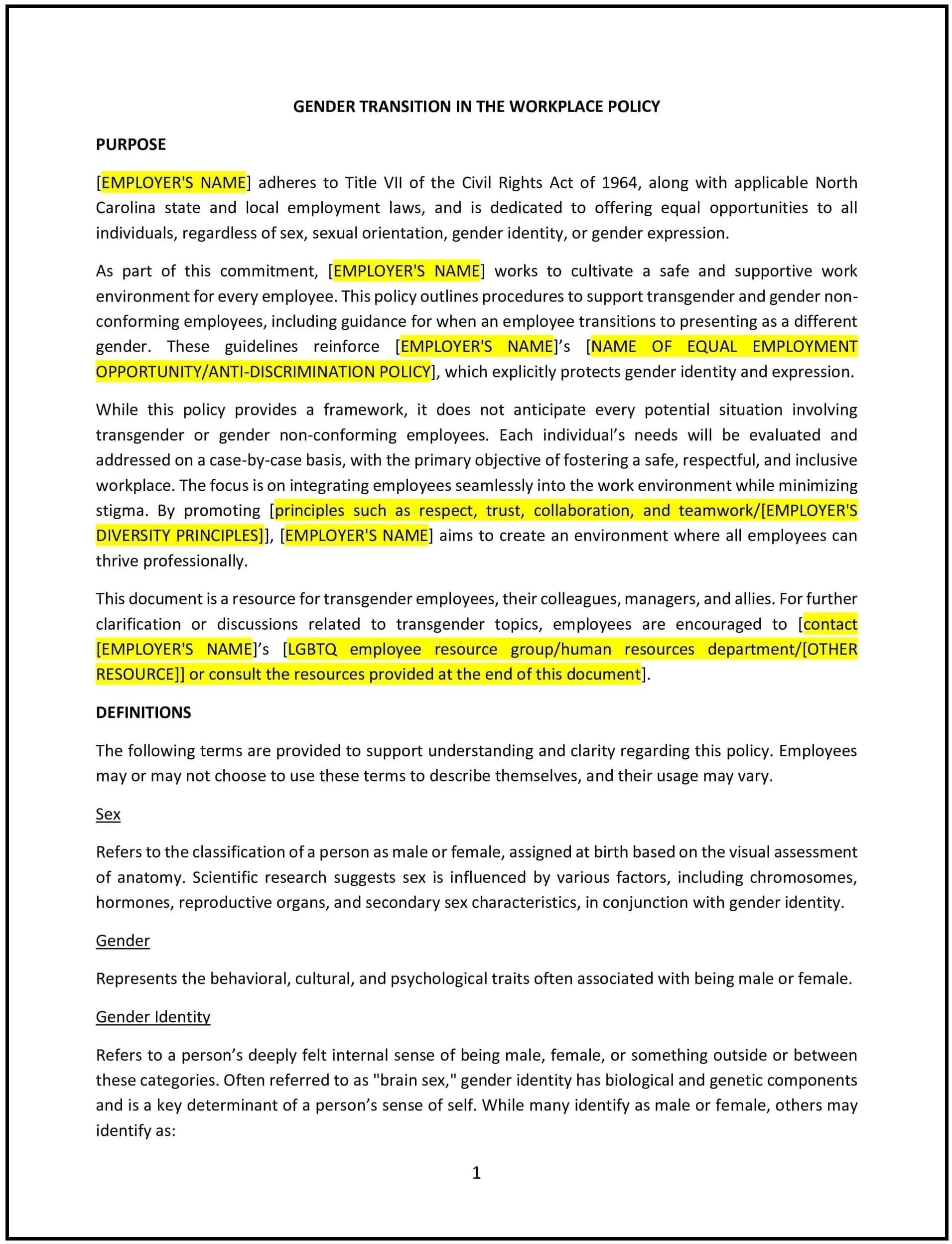Gender transition in the workplace policy (North Carolina): Free template
Got contracts to review? While you're here for policies, let Cobrief make contract review effortless—start your free review now.

Customize this template for free
Gender transition in the workplace policy (North Carolina)
A gender transition in the workplace policy helps North Carolina businesses create an inclusive, supportive, and respectful environment for employees undergoing gender transition. This policy outlines the company's commitment to supporting employees through the transition process, ensuring that employees are treated fairly and with dignity, and providing practical guidance on how to address issues related to gender identity, workplace accommodations, and privacy.
By adopting this policy, businesses can demonstrate their commitment to diversity, equity, and inclusion while providing a safe space for all employees, regardless of their gender identity.
How to use this gender transition in the workplace policy (North Carolina)
- Define gender transition: Provide a clear definition of gender transition and its stages, recognizing that it may involve changes in name, pronouns, gender expression, and/or medical treatments.
- Outline support and accommodations: Specify the types of support and accommodations the company will offer, such as adjusting uniforms, using preferred names and pronouns, or modifying work schedules or duties if necessary.
- Ensure confidentiality: Establish guidelines to ensure that the employee's gender identity, medical information, and transition details are kept confidential, with disclosure limited to those who need to know.
- Provide guidance for managers and employees: Offer training for managers and staff on how to respect an employee’s transition, how to use correct names and pronouns, and how to foster a supportive environment.
- Reflect North Carolina-specific considerations: Ensure that the policy complies with North Carolina state laws regarding discrimination, including protections for gender identity, and federal laws such as Title VII of the Civil Rights Act.
Benefits of using this gender transition in the workplace policy (North Carolina)
This policy provides several benefits for North Carolina businesses:
- Promotes inclusivity: By providing a clear, supportive policy for employees undergoing gender transition, businesses foster an inclusive workplace where all employees feel respected and valued.
- Reduces legal risk: Having a well-defined policy in place helps businesses comply with North Carolina’s anti-discrimination laws and federal protections for gender identity, reducing the risk of discrimination claims.
- Enhances employee retention: Supporting employees through gender transition increases employee loyalty and retention, as individuals feel supported and valued by their employer.
- Improves company reputation: A commitment to gender inclusivity helps businesses attract top talent, especially from diverse and underrepresented groups, and enhances their reputation as an employer of choice.
- Supports diversity and inclusion: A gender transition policy aligns with broader diversity, equity, and inclusion goals, helping to create a culture of respect and fairness.
Tips for using this gender transition in the workplace policy (North Carolina)
- Communicate the policy clearly: Ensure that all employees, especially managers, understand the company’s commitment to supporting gender transition and know how to handle related requests or issues.
- Train managers and staff: Offer training to ensure managers and staff are aware of how to respect employees undergoing gender transition, including the use of correct names, pronouns, and other accommodations.
- Regularly assess support measures: Regularly check in with employees undergoing gender transition to ensure that the accommodations are effective and that they feel supported in their work environment.
- Review the policy regularly: The policy should be reviewed annually to ensure it remains aligned with North Carolina’s laws and reflects any changes in company practices or employee needs.